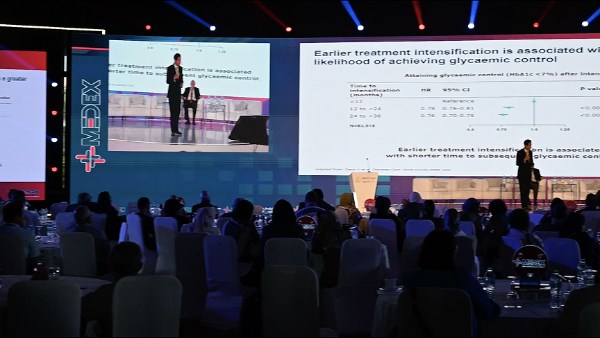The two-day event drew the participation of over 300 endocrinologists
More than 300 regional experts gather in Cairo for Boehringer Ingelheim’s Forums to discuss latest advances in cardio-renal-metabolic care

Cardiovascular1, renal2, and metabolic diseases3 account for up to 20 million deaths annually.
Cardiovascular4, renal5, and metabolic diseases6 are interconnected, co-exist, and can amplify one another, resulting in a significant burden on patients' lives.
Hosted by Boehringer Ingelheim, the ‘CRM Summit’, an expert engagement forum, and the ‘IMETA CRM Discussions for EXperts (MEDEX CRM)’, a scientific expert meeting, brought together healthcare professionals to facilitate discussions on the latest advances in the management of cardiovascular, renal, and metabolic diseases.
Boehringer Ingelheim, a leading research-driven biopharmaceutical company, hosted a dedicated event aimed at improving outcomes for patients living with cardiovascular, renal, and metabolic (CRM) diseases, such as chronic kidney disease, type 2 diabetes, and heart failure. The two-day event drew the participation of over 300 endocrinologists, nephrologists, cardiologists and primary care physicians from the Middle East and Africa, and was held on October 11th and 12th at the Dusit Thani LakeView in Cairo, Egypt. This edition of the event combined two meetings, the ‘CRM Summit’, an expert engagement forum, and the ‘IMETA CRM Discussions for EXperts (MEDEX CRM)’, a scientific expert meeting.

CRM diseases affect over one billion people globally1 and pose a significant burden on both patients and healthcare systems. These interconnected conditions are the leading cause of death worldwide,1 accounting for up to 20 million deaths annually.2,3 The intricate connection between the CRM systems signifies that disease in one system can often exert negative effects on others, increasing the risk of complications7. In light of this connection, extensive research has demonstrated that an integrated and multidisciplinary approach to treatment is essential for improving outcomes.7
The ‘CRM Summit’, held on the first day of the event, provided a forum for international and regional medical experts to discuss the urgency of early detection and diagnosis of interconnected CRM diseases. ‘MEDEX CRM’, the well-established medical education platform, which first launched in 2019, followed the next day. Participants delved into the latest data around CRM diseases and treatment guidelines, with this year’s meeting emphasizing the critical role of early diagnosis and intervention in chronic kidney disease. The event underscored the importance of having at-risk patients undergo both urine and blood tests to detect early signs of the serious renal disease. Both meetings included interactive case studies led by the international and regional faculties, mimicking real world clinical scenarios for attending doctors.
Derek O’Leary, Regional Managing Director at Boehringer Ingelheim for the India, Middle East, Turkey and Africa (IMETA) region, said, “At Boehringer Ingelheim, we are committed to innovating and improving the health of people affected by cardio-renal-metabolic diseases. Beyond developing innovative therapeutic solutions for patients, we prioritize building a collaborative network that brings the regional medical community together through hosting forums such as the ‘CRM Summit’ and ‘MEDEX CRM’. Dedicated to raising awareness about CRM diseases and discussing the latest treatment advances, this event supports us in fulfilling our company’s purpose of driving life forward and transforming lives for generations.”
Prof. Ibrahim Elebrashy, Professor of Internal Medicine, Diabetes and Endocrinology, Faculty of Medicine, Cairo University, FRCP Edinburgh, said, “As we gather here today, it is evident that the increasing prevalence of diabetes in the region demands more of our attention and collective action. With the number of people with diabetes in the Middle East and North Africa (MENA) region predicted to increase by 86% to reach 136 million by 20458, and with our improved understanding of the interconnected nature of CRM diseases, it is crucial to embrace a mindset shift that recognizes this interconnectivity and treats those diseases accordingly.” Prof. Elebrashy added, “Adopting a holistic, multidisciplinary approach is key to protecting the health of the heart and kidneys in type 2 diabetes patients.”7
Prof. Merlin Thomas, Clinician Scientist and Program Leader in the Department of Diabetes at Monash University, said, “Forums like the ‘CRM Summit’ and ‘MEDEX CRM’ play an important role in raising awareness of the importance of early detection and intervention in chronic kidney disease and interconnected conditions. It is crucial to keep highlighting the importance of monitoring kidney health for patients at risk. Two essential tests for this purpose should be considered – the urine albumin-creatinine ratio (uACR) test and the estimated glomerular filtration rate (eGFR) blood test.”9
Prof. Abdullah Alenezi, Consultant Cardiologist at Chest Diseases Hospital – Kuwait, added, “As it stands, heart failure affects over 64 million globally.10 In the Middle East, the average age of heart failure patients is at least ten years younger than it is in western counterparts.11 This reflects the importance of such meetings that urge the healthcare community to stand united in the fight against heart failure and its interconnected conditions.”
As a leading biopharmaceutical company, Boehringer Ingelheim is committed to bringing value through innovation to patients living with CRM diseases. The company takes a long-term and holistic approach to improving the health of patients affected by these interconnected conditions. By driving life forward and leading the science that results in breakthrough therapies, Boehringer Ingelheim stays true to its purpose of improving the health of communities today, and for future generations.



















